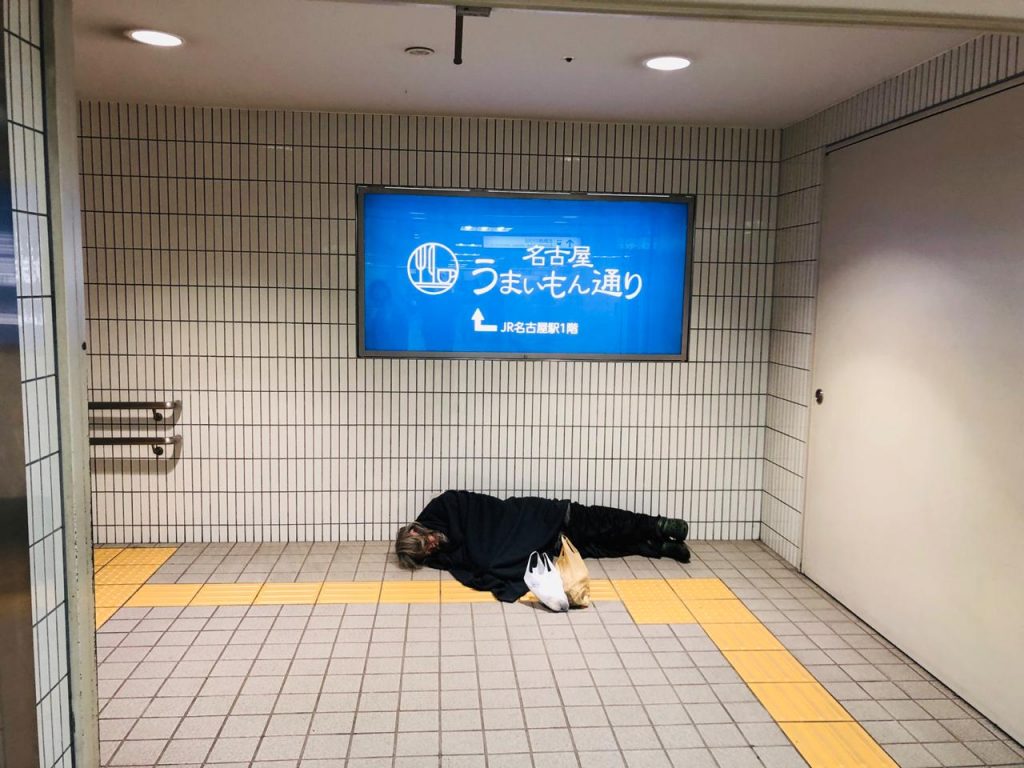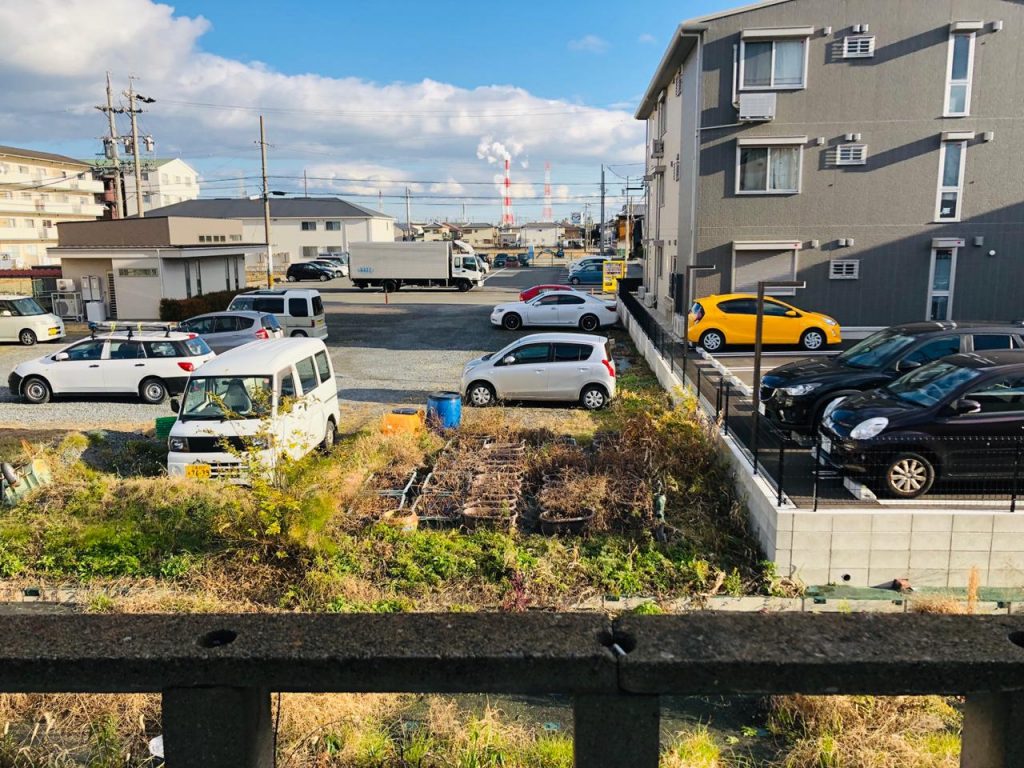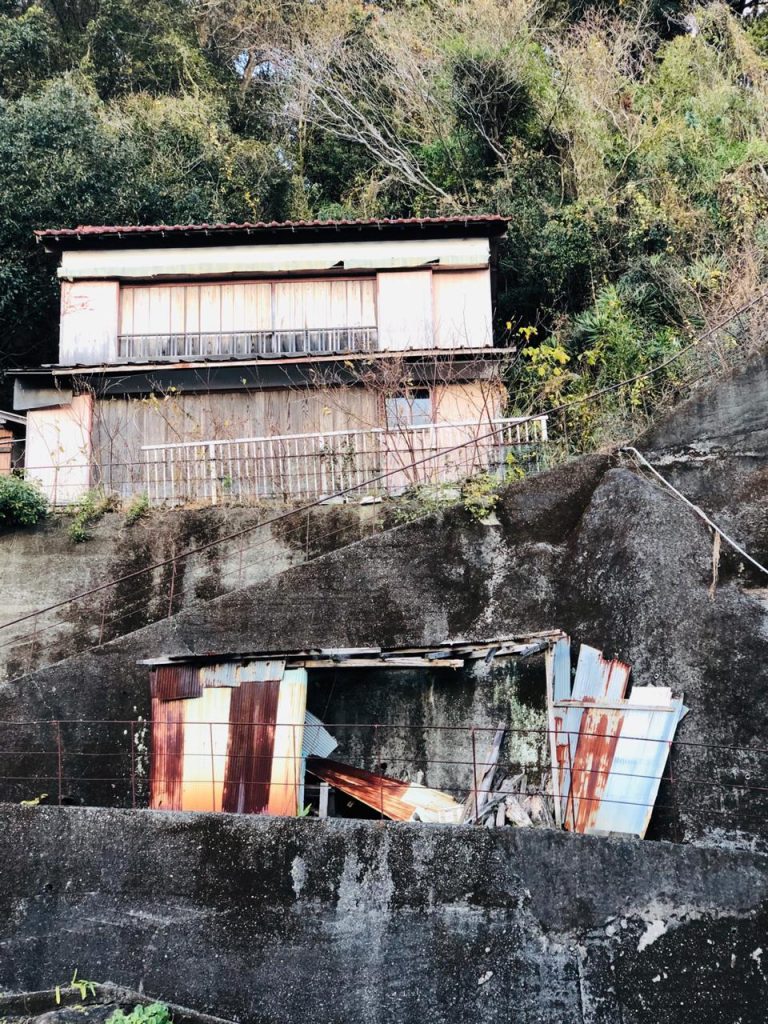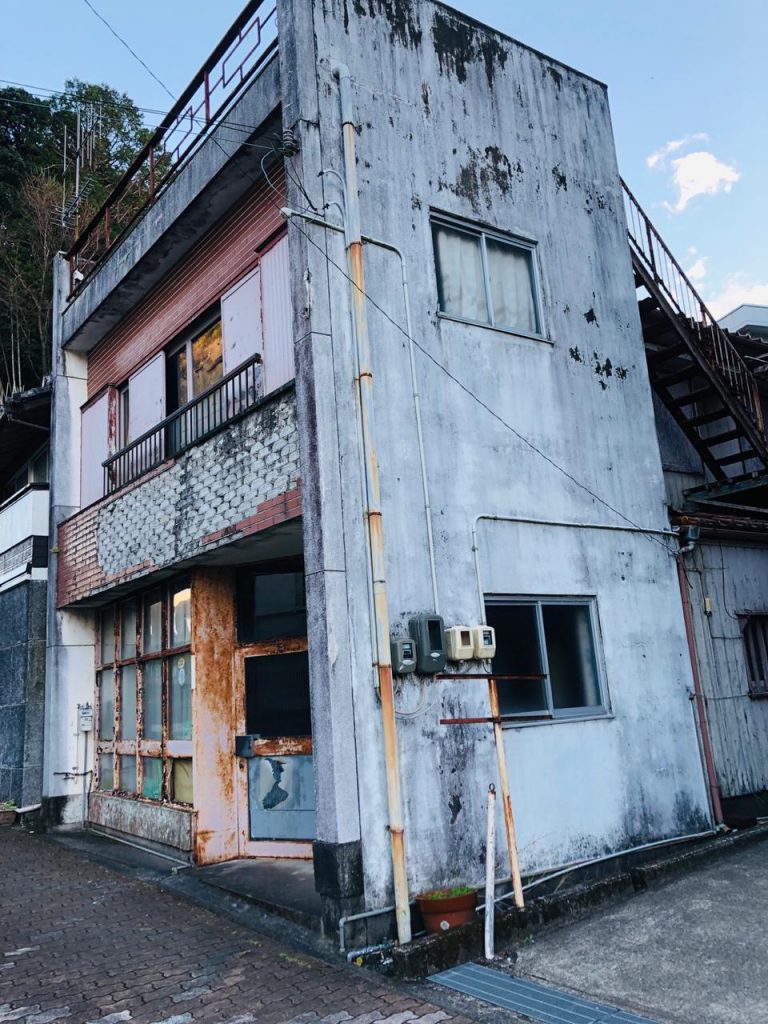Andre Vltchek
There used to be a pair of beautiful swings for children, not far from an old rural temple in Mie Prefecture, where I used to frequently power walk, when searching for inspiration for my novels. Two years ago, I noticed that the swings had gotten rusty, abandoned, and unkempt. Yesterday, I spotted a yellow ribbon, encircling and therefore closing the structure down. It appears that the decision had already been made to get rid of the playground, irreversibly.

One day earlier, I observed an old homeless man sleeping right under a big sign which was advertising a cluster of luxury eateries at the lavish Nagoya train station.
And in the city of Yokkaichi, which counts some 350,000 inhabitants, almost all but very few bus lines had disappeared. What had also disappeared was an elegant and unique, shining zodiac, which used to be engraved into the marble promenade right in front of the Kintetsu Line train station, the very center of the city. The fast ferry across the bay, connecting Yokkaichi with Centrair International Airport that serves Nagoya and in fact almost the entire area of Central Japan, stopped operating, as the municipal subsidies dried up. Now people have to drive some seventy kilometers, all around the bay, burning fuel and paying exuberant highway tolls and airport parking fees, to make it to their flight. What used to constitute public spaces, or even just rice fields, is rapidly being converted into depressing parking lots. It is happening in Central Japan, but also as far southwest as the city of Nagasaki, and as north as Nemuro.
Homeless people are everywhere.Cars (Japan now has more cars per capita than the United States) are rotting in the middle of rice fields and at the edges of once pristine forests, as they lose value rapidly, and it costs a lot of money to get rid of them properly. Entire rural villages are being depopulated, in fact turning into ghost towns. There is rust, bad planning and an acute lack of anything public, all over the country.

Japan is in decay. For many years, it was possible,with half-closed eyes,to ignore it, as the country was due to inertia hanging on to the top spot of the richest nations on Earth. But not anymore: the deterioration is now just too visible.
The decay is not as drastic as one can observe in some parts of France, the United States, or the UK. But decay it is. The optimistic, heady days of nation-building are over. The Automobile industry and other corporations are literally cannibalizing the country, dictating its lifestyle. In smaller cities, motorists do not yield on pedestrian crossings anymore. Cars are prioritized by urban planners, and some urban planners are paid, bribery by the car industry. Many areas can now only be reached by cars. There are hardly any public exercise machines, and almost no new parks. Japan, which prides itself on producing some of the most refined food, is now fully overwhelmed by several chains of convenience stores, which are full of unhealthy foodstuff.

For generations, people were sacrificing their lives in order to build a prosperous, powerful and socially balanced Japan. Now, there is no doubt that the citizens are there mainly to support powerful corporations or in short: big business. Japanese used to have its own and distinct model, but now the lifestyle is not too different from one that could be observed in North America or Europe. For the second time in its history, Japan has been forced to ‘open to the world’ (read: to Western interests and to the global capitalist economy), and to accept the concepts that used to be thoroughly alien to the Asian culture. The consequences were quick to arrive, and in summary, they have been thoroughly disastrous.
*
After WWII, Japan had to accept occupation. The Constitution was written by the US. Defeated but determined to rebuild and join the ranks of the richest countries on earth, Japan began collaborating with the West, first supporting the brutal invasion to Korea (the so-called “Korean War”). It totally gave up on its independence, fully surrendering its foreign policy, which gradually became indistinct from that of the United States in particular, and the West in general. The mass media has been, since the end of the war to now, controlled and censored by the regime in Tokyo. Major Japanese newspapers, as well as the Japanese national broadcaster NHK, would never dare to broadcast or publish any important international news, unless at least one major US or British mainstream media outlet had set the tone and example of how the story should be covered by the mass media in the ‘client’ states. In this respect, the Japanese media is not different from its counterparts in countries such as Indonesia or Kenya. Japan is also definitely not a ‘democracy’, if ‘democracy’ simply means the rule of the people. Traditionally, Japanese people used to live mainly in order to serve the nation, which was perhaps not such a bad concept. It used to work, at least for the majority. However, now, they are expected to sacrifice their lives solely for the profits of corporations.
People in Japan do not rebel, even when they are robbed by their rulers. They are shockingly submissive.
Japan is not only in decay. It tries to spread its failure like an epidemy. It is actually spreading, and glorifying its submissive, subservient foreign and domestic policies. Through scholarships, it is continuously indoctrinating, and effectively intellectually castrating tens of thousands of willing students from the poor Southeast Asian nations, and other parts of the world.
*
In the meantime, China, which is literally ‘next door’, is leading in scientific research, in urban planning, and in social policies. With ‘Ecological Civilization’ now part of its Constitution, it is way ahead of Japan in developing alternative sources of energy, public transportation, as well as organic food production. By 2020, there will be no more pockets of extreme poverty on the entire huge territory of China.
And in China, it is all done under the red Communist banners, which the Japanese public has been taught to despise and reject.
Tremendous Chinese determination, zeal, genius and socialist spirit are evidently superior, compared to the sclerotic, conservative and revanchist spirit of modern Japan and of its handlers in the West.The contrast is truly shocking and very clearly detectable even with unarmed eyes.
And on the international stage: while Japanese corporations are plundering entire countries, and corrupting governments, China is helping to put entire continents back on their feet, using good old Communist internationalist ideals. The West does its best to smear China and its great efforts, and Japan is doing the same, even inventing new insults, but the truth is more and more difficult to hide. One speaks to Africans, and he or she finds out quickly what goes on. One travels to China, and everything becomes even clearer. Unless one is paid very well not to see.
*
Instead of learning and deciding to totally change its economic and social system, Japan is turning into a sore loser. It hates China for succeeding under its independent policies, and under its Communist placards. It hates China for building new and beautiful cities designed for the people. It hates China even for doing its best to save the environment, as well as the countryside. And it hates China for being fully independent, politically and socially, even academically.
China tried‘playing’footsies with the Western academia, but the game almost turned deadly, leading to ideological infiltration and the near collapse of China’s intellectual independence. But at least the danger was identified, and the Western subversion was quickly stopped, just 5 minutes to Midnight so to speak; before it was too late.
In Japan, submission and collaboration with the Western global imperialist regime is worn as some code of honor. Japanese graduates of various US and UK universities frame their university diplomas and hang them on the wall, as if they’d symbolize great proof of their success, instead of collaboration with the system which is ruining almost entire planet.
*
I remember, some fifteen years ago, Chinese tourists would stand on the bullet train platforms all over Japan, with their cameras ready, dreaming. When train would pass, they’d sigh.
Now, China has the most extensive and the fastest bullet train network in the world. Their trains are also more comfortable and incomparably cheaper than the Japanese or French ones; priced so everyone can afford to travel.
Chinese women used to eye, sadly, the offerings of Japanese department stores. iPhones were what the middle class was dreaming of possessing. Now Chinese visitors to Japan are dressed as elegantly as the locals, iPhones are not considered a luxury, and actually, Huawei and other Chinese manufacturers are now producing better phones than Apple.
I also remember how impressed Chinese tourists to Japan were with the modern architecture, international concert halls, and elegant cafes and boutiques.
Now, the cultural life of Beijing and Shanghai is incomparably richer than that of Tokyo or Osaka. Modern architecture in China is much more impressive, and there are innovations in both the urban and rural life of China, that are still far from being implemented in Japan.
While public playgrounds in Japan are being abandoned or converted into parking lots, China is building new parks, huge and small, recovering river and lake areas, turning them into public spaces.
Instead of omnipresent Japanese advertisements, China is placing witty and educative cartoons speaking about socialist virtues, solidarity, compassion and equality, at many arteries, even at the metro trains. Ecological civilization is ‘advertised’ basically everywhere.
Japanese people are increasingly gloomy, but in China, confident smiles are seen at each and every step.
China is rising. It is unstoppable. Not because its economic growth (government is actually not interested in it, too much, anymore), but because the quality of life of the Chinese citizens is going steadily up.
And that is all that really matters, isn’t it? We can clearly improve the life of people under a tolerant, modern Communist system. As long as people smile, as long they are educated, healthy and happy, we are clearly winning!
*

Some individuals are still chasing those magic images of pristine Japanese forests and lakes. Yes, they are still there, if you search very hard. Tea rooms and trees, lovely creeks. But you have to work very hard, you have to edit and search for the perfect shots, as Japanese cities and countryside are dotted with rotten cars and weird metal beams, with unkempt public spaces, with ugly electric wires hanging everywhere. As long as money can be saved, as long as there is profit, anything goes.
Japanese people find it hard to formulate their feelings on the subject. But in summary: they feel frustrated that the country they used to occupy and torture, is doing much better than their own. To Japanese imperialists, the Chinese were simply‘sub-humans’. It is never pronounced, but Japan has only been respecting Western culture and Western power. And now, the Chinese ‘sub-humans’ are exploring the bottoms of the oceans, building airplanes, running the fastest trains on earth, and making wonderful art films. And they are set on liberating the oppressed world, through its ‘Belt and Road Initiative’, and through other incredible ideas.
And what is Japan doing? Selfies and video games, idiotic meaningless nihilist cartoons, brainless social media, an enormous avalanche of uninventive pornography, of decorative ‘arts’, pop music and mass-produced cars. Its people are depressed. I have three decades of history with Japan, I know it intimately, still love it; love many things about it, but I also clearly see that it is changing, in fact collapsing. And it is refusing to admit it, and to change.

I work with China, because I love where it is going. I like its modern Communist model (I was never a great supporter of the “Gang of Four”and their cult and glorification of poverty)– let all Chinese people be rich soon, and let the entire oppressed world be wealthy as well!
But that is not what Japan wants. For some time, it felt ‘unique’. It was the only rich Asian country. The only Asian country allowed to be rich, by the West. During apartheid, in South Africa, the Japanese people were defined as “honorary whites”. It is because they had embraced Western culture. Because they opted to plunder the world, together with the Europeans and North Americans, instead of helping the subjugated nations. In many ways, it was a form of political and moral prostitution, but it paid well; extremely well, so its morality was simply not discussed.
Now China is getting ahead simply because of its courage, hard work, the genius of its people, and all this, under the wise leadership of the Communist Party and its central planning. Precisely under things that the Japanese people were brainwashed into hating.
This is frustrating. It is scary. So, all that submission, humiliation and bowing to the empire was for nothing?In the end, it is China, it is Communism which will win, and which will be doing the greatest service to humanity.
Yes, Japan is frustrated. These days, polls speak of some 80% of the Japanese disliking the Chinese.
As I interact with people from all corners of Japan, I am getting convinced that the Japanese public subconsciously feels that, for decades, it has been betting on the ‘wrong horse’. It is too proud to verbalize it. It is too scared to fully reflect on it. But life in Japan, at least for many, is clearly becoming meaningless, gloomy and depressing. And there is no revolution on the horizon, as the country was successfully de-politicized.
China is building, inventing, struggling and marching forward, confidently, surrounded by friends, but independently.
Japan is tied up and restrained. It cannot move. It doesn’t even know how to move, how to resist, anymore.
And that is why Japan hates China!